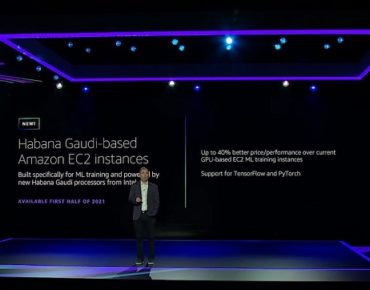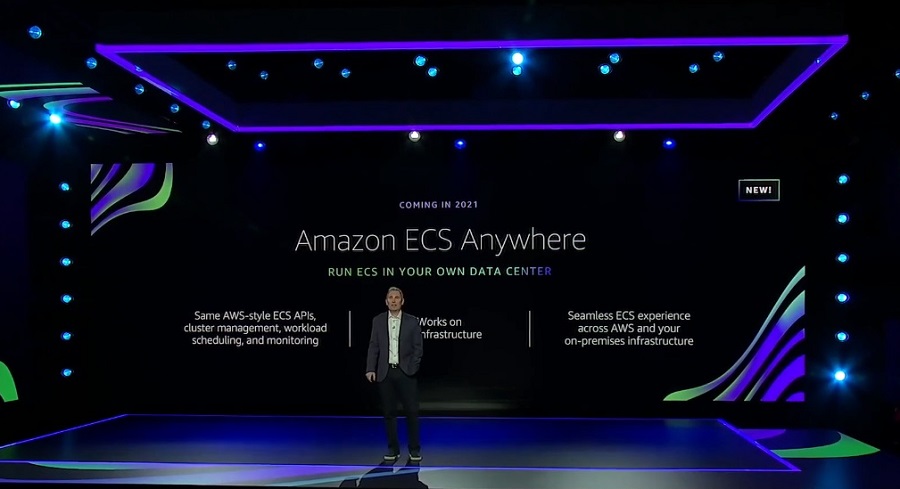At AWS re:Invent 2020, AWS Unveils Habana Gaudi AI Chips for Amazon EC2 Instances

AWS re:Invent 2020—Amazon Web Services has a broad swath of new and bolstered services coming for customers in 2021, from the implementation of powerful Habana Gaudi AI accelerators in Amazon EC2 instances for machine learning workloads to custom-designed AWS Trainium ML training chips built to cut cloud training costs.
The new products were announced on Tuesday (Dec. 1) by AWS CEO Andy Jassy, who opened the company’s 9th annual re:Invent educational and learning conference with a virtual keynote from Seattle for the first time ever due to the COVID-19 pandemic.
Also slated for arrival in 2021 are new Graviton2-equipped AWS instances, new AWS GP3 general purpose data storage volumes, and on-premises ECS Anywhere (Elastic Container Service) and EKS Anywhere (Elastic Kubernetes Service) offerings that allow customers to run Amazon services inside their own data centers for the first time. Other upcoming products and service updates include the introduction of the AWS Aurora Serverless v.2, and new Lambda Containers Support.
The new Habana Gaudi-based Amazon EC2 instances will be offered in the first half of 2021, said Jassy, through a partnership between AWS and Intel. The Gaudi accelerators promise 40% better price-performance than the best performing GPU instances today, according to AWS.
“It will work with all the main machine learning frameworks, PyTorch as well as TensorFlow,” and will help the company keep pushing the price-performance envelope and machine learning training advancements, said Jassy. The Gaudi accelerators are designed for training deep learning models for workloads that include natural language processing, object detection and machine learning training, classification, recommendation and personalization.
Up to eight Habana Gaudi accelerators will power each EC2 ML instance. Intel acquired Habana Labs in 2019. Gaudi-based EC2 instances are designed to deliver increased performance and greater cost efficiencies for customers, while allowing developers to build new or port existing training models from graphics processing units to Gaudi accelerators, according to Intel.
AWS Trainium Chips
The company’s all-new AWS Trainium chips are machine learning chips that are custom-designed by AWS to deliver the most cost-effective training in the cloud, according to Jassy.
According to AWS, Trainium provides the highest performance with the most teraflops (TFLOPS) of compute power for ML in the cloud, while also enabling a broader set of ML applications. Trainium chips are optimized for deep learning training workloads for applications including image classification, semantic search, translation, voice recognition, natural language processing and recommendation engines.
“Trainium will be even more cost-effective than the Habana chip” and will support all the major frameworks, including TensorFlow, PyTorch and [Apache] MXnet, he said. “You're going to use the same [AWS] Neuron SDK, that our Inferentia customers use. So, if you use Inferentia for inference it will be easy to also get going on our machine learning chip Trainium. It'll be available both as an EC2 instance as well as in [the AWS] Sagemaker [ML service] in the second half of 2021.”
Arun Chandrasekaran, an analyst covering cloud native platforms, big data and AI for Gartner, told EnterpriseAI that the custom Trainium chips address an important workload and need when it comes to ML, which is a compute intensive workload. “Hence, AWS is expanding its custom chip capabilities for the end-to-end ML lifecycle,” said Chandrasekaran. “Data and analytics is one of the fastest growing use cases in cloud.”
New Graviton2-Powered Instances
Designed for compute-heavy and network-heavy workloads, AWS will also debut new C6gn instances in the next couple weeks, powered by Amazon’s Arm-based Graviton2 chips. The new instances will include 100 gigabit-per-second performance capabilities that promise to save money for customers while increasing speeds, said Jassy.
Also coming soon are new general purpose AWS GP3 (General Purpose) volumes for AWS Elastic Block Store (EBS). GP3 volumes are evolving from the previous generation of GP2 volumes that were introduced in 2014.
“The feedback that we've gotten the last year or two from customers is that we love GP2, but if we had a wish list, there's a couple things that we'd like from you,” including lower costs per gigabyte and the ability to scale throughput or IOPS without also having to scale its storage, said Jassy.
The AWS team worked on those requests, resulting in new GP3 volumes that have 20% lower costs per gigabyte with the ability to provision IOPS and throughput separately from storage, he said.
“The baseline performance if you do GP3 volumes is 3,000 IOPS and 125 megabytes per second, but you can burst that and scale that up to a peak of 1,000 megabytes per second, which is four times that of GP2,” said Jassy. “And you'll see that customers will be able to run many more of their demanding workloads on GP3 that they even were running on GP2.”
ECS Anywhere and EKS Anywhere
AWS has offered its managed Elastic Container Service (ECS) and Elastic Kubernetes Service (EKS) services to customers for several years, with more than 100,000 active ECS customers using it with billions of compute hours on EKS every week on AWS, according to Jassy. Amazon ECS is a fully managed container orchestration service, while Amazon EKS gives users a managed environment where they can start, run, and scale Kubernetes applications in the AWS cloud. Some customers, however, prefer to run these workloads on-premises, which they couldn’t do with the existing ECS and EKS services, Jassy added.
With those requests repeated by many customers, new on-premises Amazon ECS Anywhere and EKS Anywhere offerings will now be available, giving customers the options they wanted, said Jassy.
“ECS Anywhere allows you to have all the same AWS style API's and cluster configuration management pieces on-premises that you have in the cloud, so it makes it easy,” he said. “It works with all your on-premises infrastructure.”
That led to some EKS customers wanting the same capabilities, which led to the creation of EKS Anywhere for Kubernetes users, which lets EKS customers run the services in their own data centers, according to Jassy.
 Some EKS customers were so excited about the coming services in 2021 that AWS is now making the EKS Kubernetes distribution open source so that customers can start using it now, he added. “It will be exactly the same as what we do with EKS. We'll make all the same patches and updates so you can actually be starting to transition as you get ready for EKS Anywhere.”
Some EKS customers were so excited about the coming services in 2021 that AWS is now making the EKS Kubernetes distribution open source so that customers can start using it now, he added. “It will be exactly the same as what we do with EKS. We'll make all the same patches and updates so you can actually be starting to transition as you get ready for EKS Anywhere.”
Gartner analyst Chandrasekaran said that while the vast majority of clients will continue to use the services through hybrid cloud deployments, the new services offer flexibility.
“The ECS Anywhere and EKS Anywhere products provide customers with a hybrid cloud option of running application containers in a consistent manner across on-premises and AWS public cloud,” he said. “While ECS offers more operational simplicity across a hybrid environment, the EKS offering extends Kubernetes into customer data centers.”












